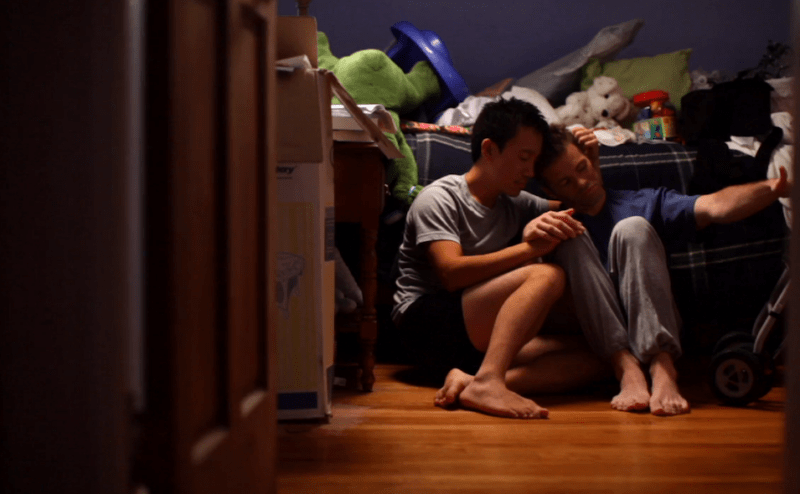
Making The Commitment: Behind the Short Film about an Interracial Gay Couple Adopting a Child
Written by Dave Walker | Posted by: NewEnglandFilm.com
Two men pull into a wooded parking lot. They pause apprehensively, as if some prior conversation is still weighing heavily on their minds. One man reaches out and grasps the hand of the other. We see the wedding band on his finger, glittering in the sunlight passing through the open window. They brace themselves and look to each other, an unspoken solidarity. Before they leave the car, one turns over his shoulder and gestures to a large cardboard box in the back seat, filled to the brim with envelopes and official documents, and asks, “Think we’ll need that?”
This image, which concludes the opening sequence of The Commitment, a short film written and directed by, as well as starring, Albert Chan, is one of many striking moments in the film, one that illuminates the complexity of the adoption process, a narrative with which much of the American public is unfamiliar. The film tells the story of two men, Robert (played by Chan) and Ethan (Jason Lane Fenton): an interracial gay couple trying to adopt a newborn child.
Chan knows the adoption process intimately, along with its many ups and downs. Shortly after he and his husband registered with an adoption agency, they received news that a young pregnant woman, looking to be matched with a gay couple, had chosen them to raise her baby. In the ensuing weeks, they hastened to make the final preparations for their baby boy — selecting a pediatrician, borrowing a variety of baby items, choosing a daycare, and readying themselves to be fathers of a newborn. Then, on the day they were supposed to meet the birthmother for the first time, the agency called and canceled their appointment, informing them that the woman had granted guardianship of her son to family friends instead. For Chan and his husband, having a child suddenly ripped away was heartbreaking. Sadly, it’s a feeling many adopting couples reluctantly become acquainted with. Chan and his husband would never know what led the woman to change her mind.
Chan processed his feelings of loss by writing a screenplay in the aftermath of the event. “When the incident actually happened to us, we were supposed to meet with the birthmother on the day that we found out that she had changed her mind. To go from a high to a low so quickly was disappointing.” For Chan, writing proved to be a vehicle for imagining what could have been, and for inventing some rationale that might make the arbitrary turn of events more palatable: “It was very early in the adoption process [for us]. At the time, after it happened, as an actor or a budding filmmaker, I couldn’t help but let my imagination run a bit and imagine what that meeting would have been like and what kinds of things might have been said.”
This fictional encounter is the basis for the first act of the film. Robert and Ethan arrive at a social worker’s office to meet the mother of their child-to-be, an Asian woman named Victoria (Kerri Patterson). Her stomach protruding from behind a baggy flannel shirt, Victoria tells them that she wanted a gay couple to raise her child because her brother is gay. She hasn’t seen him in years, not since her father forced him out. As they discuss naming the baby, eyes circulate around the room, passing hidden cues or searching for reinforcement. It is an appropriately delicate scene, directed with sensitivity around what isn’t said.
“It really is a very awkward situation,” Chan elaborates. “What do you actually say to a woman who wants to give you her unborn child? What are your first lines going to be like? Are you going to hug the person, are you not going to hug the person? You don’t know each other, so how intimate do you want to be? Those were the sorts of things from my imagination that I wrote into the screenplay.”
As the scene progresses, a racial element surfaces as well. Robert and Ethan express their excitement at getting an Asian baby. Ethan mentions to the mother that in the United States, especially for a gay couple, it is rare to find an Asian child for adoption. Most international countries, including China and Korea, don’t allow same-sex couples to adopt children. This racial component feels laden with tension in the scene, like a fault line ready to open beneath the couple. We get the sense that Robert and Ethan are not completely aligned in their desire to have an Asian baby. Indeed, racial preference can be a divisive factor for many adopting parents and is often something they grapple with internally. “I think with most adoption agencies, you do have the opportunity to state your racial preferences and also the level of medical issues you’re willing to deal with, including drugs or genetic issues,” Chan, who is Chinese-Canadian, explains. “You really have to think within yourself and be honest with yourself about what it is you want and what it is you might not be able to handle. There are no easy answers to that. Some people can feel like they are making decisions that paint themselves as bad people. In the end, you have to make the decision that’s right for you. I introduced the racial component into The Commitment because it was something that my husband and I thought a lot about. What races were we open to having? We felt that to introduce a third race into our family might complicate things.”
Chan admits that he felt responsible for the film to reflect some of the broader social issues he has experienced personally. “It was my impression at the time that there wasn’t really a film that dealt with adoption so explicitly and so realistically. So I wanted to shed some light on that. I think everyone has their own unique and complicated story when it comes to adoption. In the movies, you tend to have someone saying ‘I want to adopt your child,’ and then they do. You don’t see any process behind it. It’s just a plot point to move things along in the film. [Part of my mission was] to bring an awareness of what couples, or single people, go through when they adopt.”
Chan also draws inspiration from his experience as an actor. He believes an actor’s primary charge is to help tell the story and sees his performance in The Commitment as an extension of his role as screenwriter and director. In a film where so much of the story lives in the spaces between the lines, the actors’ interpretation of the dialogue is critical.
Jason Lane Fenton, playing Ethan, delivers an understated performance and provides an effective counterpoint to Robert’s meticulous self-certainty. One scene features him sitting alone in the baby room, sleepless in the middle of the night, surrounded by child’s toys, kept awake by doubt. “You’ve thought of everything,” he tells Robert “Do you think I’ll be a good father?” The image of the two sitting there together, Ethan’s hand on an empty stroller, is one of the enduring images of the film. The small ensemble is rounded out by Mary Niederkorn, who plays Susan, a social worker serving as a liaison between the couple and potential birthparent matches. Her role is minor, but critical, and garnered the film a Media Award for Best Film from the National Association of Social Workers (edging out Oscar-nominated Moonrise Kingdom and What To Expect When You’re Expecting) for its realistic portrayal of the problems social workers tackle everyday.
Not surprisingly, the film’s success on the indie film festival circuit has been inflected by its multiple niche-appeals — with the LGBT community, the Asian-American population, and, to a smaller extent, people in adoptive families. People are able to see the political message they want to see in the film. For many audiences, especially those with unique interests, the film champions the cause of the modern family. It offers a validation of the work many interest groups have undertaken in the pursuit of racial and sexual preference equality. Chan commented that, in his conversations with audiences after screenings, people have magnified a political agenda implicit in the story. “[Making a political film] wasn’t really my intention. It was my intention to make a film about two people in love and committed to each other. For me, the film is universal. People have asked me if I plan to use the film to fight for marriage equality and my response to that usually is that the people who are watching it are usually already pretty supportive of gay marriage. But film is powerful. You do have the power to change hearts and minds and that’s really what I wanted to do with this film whether or not it be for specifically gay issues.”
For Chan, the film is certainly an edifying work, but moreover, a deeply personal one. Chan cites Ang Lee, the visionary director behind modern classics like Crouching Tiger, Hidden Dragon, Brokeback Mountain and most recently, Life of Pi, as one of his major influences. Despite recurring themes of alienation and repression of marginalized people, Lee’s career has spanned a great diversity of subject matter and encompasses a broad palette of genres and characters. “If I think of Ang Lee and how different his projects are,” Chan remarks, “I don’t want to be known as a gay filmmaker who does gay issues.” He doesn’t necessarily aim to focus on this subject matter or life as a gay parent in his future films, but instead plans to continue to explore other facets of his life. His next project currently in development, Descendants of the Past, Ancestors of the Future, is a dramatic excavation of his own family history and his experiences as the son of Chinese immigrants.
The charm of this film is that despite the particulars of its characters and the various niches it fits into, it deals with universal emotions –- the trepidation a young couple feels in the days leading up to the birth of their child. “Whatever film I created ultimately had to come back to Robert and Ethan and their relationship to each other,” Chan insists. “Some kind of realization, or some kind of change, [had to] happen in that relationship. When I attend screenings, the audiences react almost identically in every screening. They laugh at the same places. They cry at the same places.”
You’ll have to see for yourself whether the film itself has a happy ending, but for Chan and his husband Richard, producing the film paralleled their own commitment to becoming parents. Two weeks after production on the film wrapped, their son Andrew was born, the result of their fifth birthparent match and over a year’s worth of steadfast patience. Their eventual success with adoption offers a promising epilogue, a continuation and fulfillment of the dream held by their fictional counterparts in the film and by people throughout the country, whether gay, heterosexual, or single, seeking to become parents.
The film is still only about halfway through its festival run and will continue to screen at festivals in April, including the Boston International Film Festival on Wed. April 17th at 8pm and the Southeast New England Film Music and Arts Festival in Providence, RI on Saturday April 27th at 5:45pm. Visit the film’s website to learn more.
The film is still only about halfway through its festival run and will continue to screen at festivals in April, including the Boston International Film Festival on Wed. April 17th at 8pm and the Southeast New England Film Music and Arts Festival in Providence, RI on Saturday April 27th at 5:45pm. Visit the film's website to learn more.









